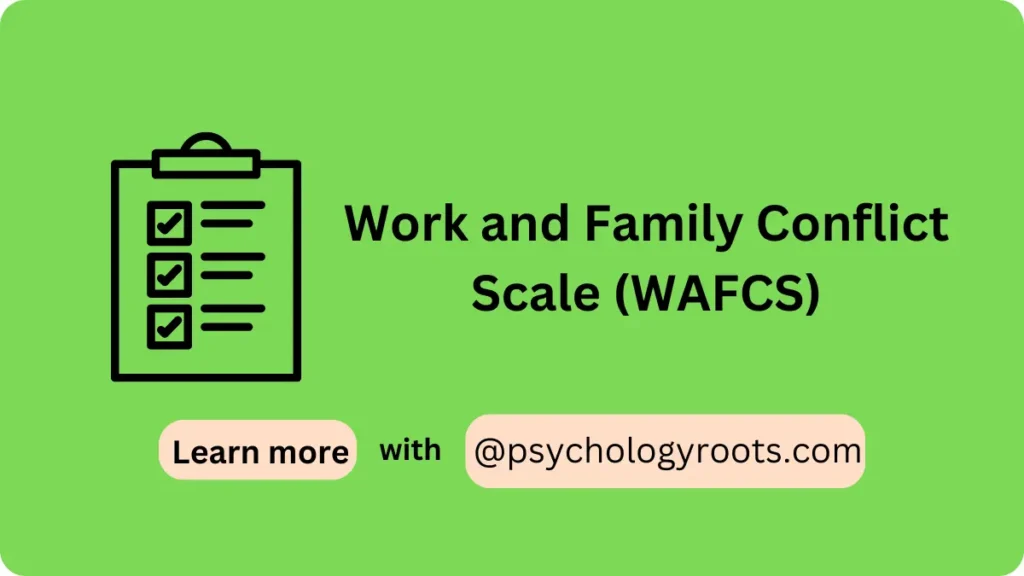Table of Contents
Work and Family Conflict Scale (WAFCS)
Here in this post, we are sharing the “Work and Family Conflict Scale (WAFCS)”. You can read psychometric and Author information. We have thousands of Scales and questionnaires in our collection (See Scales and Questionnaires). You can demand us any scale and questionnaires related to psychology through our community, and we will provide you with a short time. Keep visiting Psychology Roots.
About Work and Family Conflict Scale (WAFCS)
Scale Name
Work and Family Conflict Scale (WAFCS)
Author Details
Haslam, D., Filus, A., Morawska, A., Sanders, M. R., & Fletcher, R.
Translation Availability
Not Sure

Background/Description
The Work and Family Conflict Scale (WAFCS) was developed by Haslam, Filus, Morawska, Sanders, and Fletcher in 2015 to assess the conflicts that arise between work and family responsibilities. This self-report measure was specifically designed for use with parents, addressing the challenges they face in balancing their professional duties with family life. The WAFCS is grounded in the recognition that work and family are two critical domains in an individual’s life, and conflicts between these roles can significantly impact psychological well-being, job performance, and family functioning.
The WAFCS captures two primary dimensions of work-family conflict:
- Work-to-Family Conflict (WFC): This dimension assesses the extent to which work demands interfere with family responsibilities, such as the inability to attend family events or participate in household activities due to work obligations.
- Family-to-Work Conflict (FWC): This dimension measures the extent to which family demands impact work responsibilities, such as being late to work or less productive due to family duties.
The scale includes items that reflect both time-based and strain-based conflicts, providing a comprehensive assessment of how work and family roles can interfere with each other. The WAFCS has been validated across different populations, making it a reliable tool for both research and practical applications in understanding and addressing work-family conflict among parents.
Administration, Scoring and Interpretation
- Participant Selection: The WAFCS is intended for parents who are balancing work and family responsibilities. It can be administered in research settings or as part of workplace assessments to better understand employees’ challenges.
- Questionnaire Distribution: The WAFCS can be administered as a paper-and-pencil questionnaire or electronically. Participants are asked to respond to each item based on their experiences over a recent period (e.g., the past month).
- Response Format: The WAFCS consists of a series of statements related to work-family conflict. Participants rate each statement on a Likert scale, typically ranging from 1 (strongly disagree) to 5 (strongly agree).
Reliability and Validity
The Work and Family Conflict Scale (WAFCS) has been shown to have strong psychometric properties, including high reliability and validity. The scale’s internal consistency is robust, with Cronbach’s alpha values typically exceeding 0.80 for both the Work-to-Family Conflict and Family-to-Work Conflict dimensions.
The validity of the WAFCS has been supported through various studies. The scale’s construct validity is evidenced by its strong correlations with related constructs, such as job stress, family satisfaction, and overall well-being. Additionally, the scale’s criterion validity has been demonstrated by its ability to predict outcomes related to both work and family domains, such as job performance, absenteeism, and family functioning.
Available Versions
10-Items
Reference
Haslam, D., Filus, A., Morawska, A., Sanders, M. R., & Fletcher, R. (2015). The Work–Family Conflict Scale (WAFCS): Development and initial validation of a self-report measure of work–family conflict for use with parents. Child Psychiatry & Human Development, 46, 346-357.
Important Link
Scale File:
Frequently Asked Questions
Q: What is the purpose of the Work and Family Conflict Scale?
A: The WAFCS is designed to measure the extent of conflict between work and family responsibilities, particularly among parents, and to understand how these conflicts impact overall well-being.
Q: Who can use the WAFCS?
A: The scale is intended for use with parents who are balancing work and family roles. It is commonly used in research, workplace assessments, and clinical settings.
Q: What does the WAFCS measure?
A: The WAFCS measures two dimensions of conflict: Work-to-Family Conflict (WFC) and Family-to-Work Conflict (FWC), capturing how demands from one domain interfere with the other.
Q: How is the WAFCS scored?
A: The scale is scored based on participants’ responses to a Likert scale, with higher scores indicating greater conflict in either the work-to-family or family-to-work dimensions.
Q: How reliable and valid is the WAFCS?
A: The WAFCS has demonstrated high reliability and validity across studies, making it a trusted tool for assessing work-family conflict.
Disclaimer
Please note that Psychology Roots does not have the right to grant permission for the use of any psychological scales or assessments listed on its website. To use any scale or assessment, you must obtain permission directly from the author or translator of the tool. Psychology Roots provides information about various tools and their administration procedures, but it is your responsibility to obtain proper permissions before using any scale or assessment. If you need further information about an author’s contact details, please submit a query to the Psychology Roots team.
Help Us Improve This Article
Have you discovered an inaccuracy? We put out great effort to give accurate and scientifically trustworthy information to our readers. Please notify us if you discover any typographical or grammatical errors.
Make a comment. We acknowledge and appreciate your efforts.
Share With Us
If you have any scale or any material related to psychology kindly share it with us at psychologyroots@gmail.com. We help others on behalf of you.